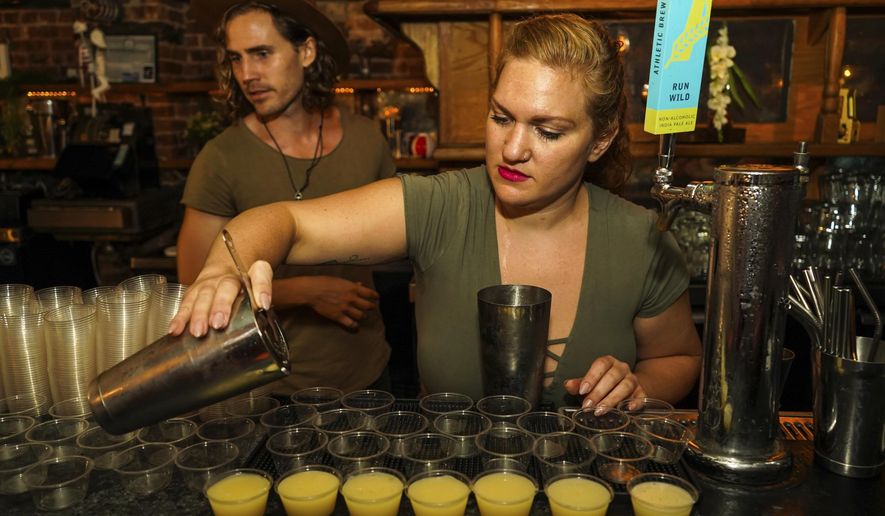Booze is out and “sober curiosity” is in as people around the world participate in Dry January and voluntarily abstain from alcohol for the month.
Whether it’s for a New Year’s resolution or for health reasons, Americans have jumped aboard the Dry January bandwagon, which originated in Britain.
“What a better time than right after the holidays, which is traditionally a very boozy time of year for people, to sort of have a reset,” said Laura Silverman, a Rockville, Maryland, resident who launched BoozeFreeInDC.com and has led a sober lifestyle for 12 years.
“I’m cool with it being trendy because I would rather people get exposure to what a sober or ‘sober curious’ or soberish lifestyle could be,” Ms. Silverman said. “Whatever gets someone’s foot in the door to wellness — and if that’s Dry January, that’s great.”
Being sober curious is easier than ever before because restaurants and breweries are offering more nonalcoholic options. Big-name nonalcoholic drinks that have entered the market recently include Heineken’s 0.0 and Pabst Blue Ribbon Non-Alc.
The nonalcoholic wine and beer market is anticipated to grow by more than 7% from 2019 to 2025, according to a report by Global Market Insights.
“Inclination towards lower alcohol content in several countries due to increasing consumer health consciousness across the world has escalated the non-alcoholic wine and beer market size,” the report says.
Some craft beer makers, including the WellBeing Brewing Co. in St. Louis, are selling nonalcoholic beverages exclusively. The brewery opened three years ago and distributes nationally.
WellBeing co-founder Jeff Stevens said the company launched an IPA on New Year’s Day for customers who want to “reset their intentions for the year.”
“I think there are a lot of trends happening that have helped the demand for nonalcoholic beer,” Mr. Stevens said. “I think there was always a demand and always a big percentage of the population that wasn’t drinking in any given situation that was being underserved.”
He recalled seeing only coffee, juice, soda and water as nonalcoholic offers at various events when he worked as a nondrinker in the beer and spirits marketing trade. Being the only person sipping soda or water while those around you are enjoying crafted alcoholic drinks can be boring and call attention to yourself, he said.
“So for me, early on I realized that nonalcoholic beer is this awesome solution to that. It makes you feel socially connected. You’re having a beer with people,” Mr. Stevens said.
In 2012, the British charity Alcohol Change UK initiated Dry January as an annual booze-free challenge that offers a chance to “ditch the hangover, reduce the waistline, boost your energy and save some serious money, while doing your body a lot of good.” The charity estimates that more than 4 million people in the United Kingdom alone participate in Dry January each year.
“We’re seeing a great deal of interest worldwide in Dry January including in the U.S., with almost 12% of users downloading the official Try Dry app,” said an administrator of the official Dry January Facebook page.
‘More freedom of choice’
Clyde’s Restaurant Group, which owns a number of restaurants in the District of Columbia including Old Ebbitt Grill and The Hamilton, began offering nonalcoholic drinks from its cocktail menu last year.
Bart Farrell, the restaurant group’s vice president of food and beverage, proposed adding two alcohol-free cocktails to the menu after reading about bars in Chicago and New York City that offer extensive menus of more creative alcohol-free cocktails.
“The days of just offering a Shirley Temple or Roy Rogers are behind us. No one wants to come in and spend $4 or $5 for that,” he said. “So in order to stay relevant, you have to stay creative.
“That was really my marching order to my team,” Mr. Farrell said. “Let’s not just put something on for the sake of a placeholder. Let’s put something on that’s attractive and that someone who is going to come into our restaurants will consider ordering if they’re not drinking.”
Mr. Farrell said he would like to add more nonalcoholic cocktails to the menu and has a sample of an Australian alcohol-free spirit arriving to test with his bartenders.
The Sans Bar D.C. chapter, founded by Ms. Silverman, is hosting a Dry January event at Epic Yoga D.C. on Jan. 25. Sans Bar, a sober bar based in Austin, Texas, hosted a national tour last year with pop-up appearances in cities including Portland, Oregon, and St. Louis.
George Koob, director of the National Institute on Alcohol Abuse and Alcoholism, said one major benefit of Dry January is that it allows people to evaluate their relationship with alcohol.
More than 14 million Americans, about 5%, end up with an alcohol use disorder at some point during their lives, Mr. Koob said. He applauded the emergence of more nonalcoholic beverages.
“It gives us more freedom of choice in these social situations,” he said. “Alcohol is a social lubricant in our society. Most people don’t have a problem. And for people who do have a problem or for people who don’t want to rely on a designated driver to take them home or they simply don’t want to drink tonight, these options are in a sense a godsend.”
He said the benefits of not drinking for a month could include increased well-being and a sense of achievement, whether it’s saving money, getting better sleep or losing weight.
One caveat of Dry January, he said, is that it’s fine for those who are not heavy drinkers but can be dangerous for people who are physically dependent on alcohol.
• Shen Wu Tan can be reached at stan@washingtontimes.com.




Please read our comment policy before commenting.